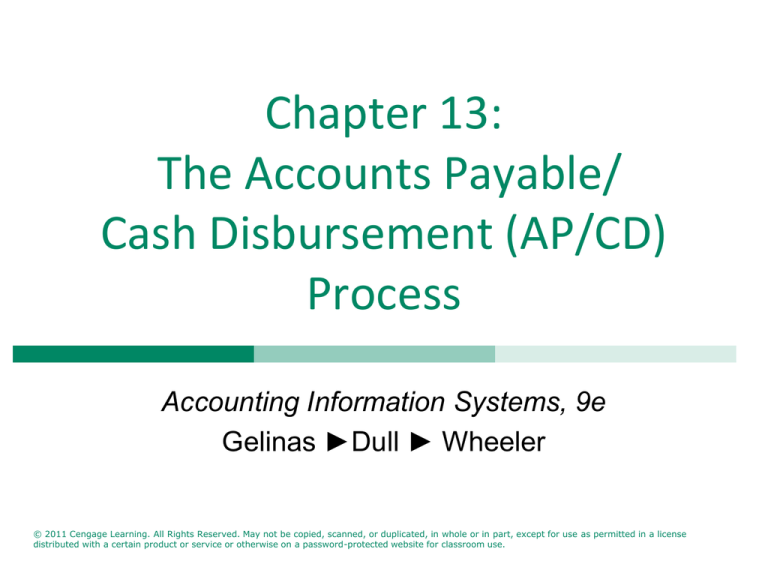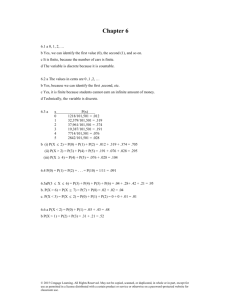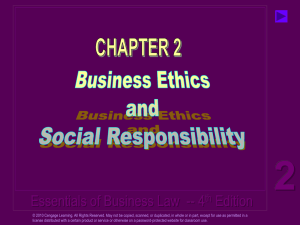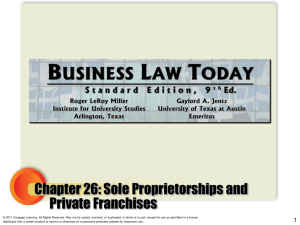
Chapter 13:
The Accounts Payable/
Cash Disbursement (AP/CD)
Process
Accounting Information Systems, 9e
Gelinas ►Dull ► Wheeler
© 2011 Cengage Learning. All Rights Reserved. May not be copied, scanned, or duplicated, in whole or in part, except for use as permitted in a license
distributed with a certain product or service or otherwise on a password-protected website for classroom use.
Learning Objectives
Describe the relationship between the AP/CD
process and its business environment.
Summarize how various technologies, including
e-invoicing and e-payments, can improve the
effectiveness of the AP/CD process.
Depict the logical and physical characteristics
of a typical AP/CD process.
2
© 2011 Cengage Learning. All Rights Reserved. May not be copied, scanned, or duplicated, in whole or in part, except for use as permitted in a license
distributed with a certain product or service or otherwise on a password-protected website for classroom use.
Learning Objectives (cont’d)
Prepare a control matrix for a typical AP/CD
process including an explanation of how
business process control plans can accomplish
operations and information process control
goals.
3
© 2011 Cengage Learning. All Rights Reserved. May not be copied, scanned, or duplicated, in whole or in part, except for use as permitted in a license
distributed with a certain product or service or otherwise on a password-protected website for classroom use.
Process Definitions and Functions
The accounts payable/cash disbursements
(AP/CD) process is an interacting structure of
people, equipment, activities, and controls that
is designed to accomplish the following:
Handle the repetitive work routines of the accounts
payable department and the cashier.
Support the decision needs of those who manage the
accounts payable department and cashier.
Assist in the preparation of internal and external
reports.
© 2011 Cengage Learning. All Rights Reserved. May not be copied, scanned, or duplicated, in whole or in part, except for use as permitted in a license
distributed with a certain product or service or otherwise on a password-protected website for classroom use.
Horizontal Perspective of the
AP/CD Process
© 2011 Cengage Learning. All Rights Reserved. May not be copied, scanned, or duplicated, in whole or in part, except for use as permitted in a license
distributed with a certain product or service or otherwise on a password-protected website for classroom use.
Description of Information Flows
© 2011 Cengage Learning. All Rights Reserved. May not be copied, scanned, or duplicated, in whole or in part, except for use as permitted in a license
distributed with a certain product or service or otherwise on a password-protected website for classroom use.
Vertical Perspective of the
Purchasing and AP/CD Processes
© 2011 Cengage Learning. All Rights Reserved. May not be copied, scanned, or duplicated, in whole or in part, except for use as permitted in a license
distributed with a certain product or service or otherwise on a password-protected website for classroom use.
The AP/CD Process—Level 0
Diagram
© 2011 Cengage Learning. All Rights Reserved. May not be copied, scanned, or duplicated, in whole or in part, except for use as permitted in a license
distributed with a certain product or service or otherwise on a password-protected website for classroom use.
AP/CD Process—Diagram 1
© 2011 Cengage Learning. All Rights Reserved. May not be copied, scanned, or duplicated, in whole or in part, except for use as permitted in a license
distributed with a certain product or service or otherwise on a password-protected website for classroom use.
Process 1.1: Validate Invoice
Vendor invoice: business document—or
electronic transmission—that notifies the
purchaser of an obligation to pay the vendor for
goods (or services) that were ordered by and
shipped (or provided) to the purchaser.
Match invoice to vendor master data.
Match invoice to PO and receiving report (i.e.,
the three-way match).
Update vendor mater data with purchase
history.
© 2011 Cengage Learning. All Rights Reserved. May not be copied, scanned, or duplicated, in whole or in part, except for use as permitted in a license
distributed with a certain product or service or otherwise on a password-protected website for classroom use.
Sample SAP Purchase Order Data
Screen
© 2011 Cengage Learning. All Rights Reserved. May not be copied, scanned, or duplicated, in whole or in part, except for use as permitted in a license
distributed with a certain product or service or otherwise on a password-protected website for classroom use.
AP/CD Process—Diagram 2
© 2011 Cengage Learning. All Rights Reserved. May not be copied, scanned, or duplicated, in whole or in part, except for use as permitted in a license
distributed with a certain product or service or otherwise on a password-protected website for classroom use.
Non-Invoiced Disbursements
In some cases disbursements are not invoiced,
e.g., freight bills, rent, payroll.
The handling of non-invoiced disbursements
depends on whether or not a voucher system is
used.
A voucher system prepares a voucher for every
expenditure from payroll to purchases of raw
materials.
© 2011 Cengage Learning. All Rights Reserved. May not be copied, scanned, or duplicated, in whole or in part, except for use as permitted in a license
distributed with a certain product or service or otherwise on a password-protected website for classroom use.
Processing Non-invoiced
Disbursements
© 2011 Cengage Learning. All Rights Reserved. May not be copied, scanned, or duplicated, in whole or in part, except for use as permitted in a license
distributed with a certain product or service or otherwise on a password-protected website for classroom use.
Logical Data Descriptions for the
AP/CD Process
Purchasing events data: contains, in
chronological sequence, the details of each
invoice that is recorded.
Accounts payable master data: repository of
all unpaid vendor invoices.
Cash disbursements event data: contains, in
chronological sequence, the details of each
cash payment made.
© 2011 Cengage Learning. All Rights Reserved. May not be copied, scanned, or duplicated, in whole or in part, except for use as permitted in a license
distributed with a certain product or service or otherwise on a password-protected website for classroom use.
Entity-Relationship (E-R) Diagram
(Partial) for the AP/CD Process
© 2011 Cengage Learning. All Rights Reserved. May not be copied, scanned, or duplicated, in whole or in part, except for use as permitted in a license
distributed with a certain product or service or otherwise on a password-protected website for classroom use.
Selected Relational Tables (Partial)
for the AP/CD Process
© 2011 Cengage Learning. All Rights Reserved. May not be copied, scanned, or duplicated, in whole or in part, except for use as permitted in a license
distributed with a certain product or service or otherwise on a password-protected website for classroom use.
Selected Relational Tables (Partial)
for the AP/CD Process (cont’d)
© 2011 Cengage Learning. All Rights Reserved. May not be copied, scanned, or duplicated, in whole or in part, except for use as permitted in a license
distributed with a certain product or service or otherwise on a password-protected website for classroom use.
Selected Relational Tables (Partial)
for the AP/CD Process (cont’d)
© 2011 Cengage Learning. All Rights Reserved. May not be copied, scanned, or duplicated, in whole or in part, except for use as permitted in a license
distributed with a certain product or service or otherwise on a password-protected website for classroom use.
Technology Trends and
Developments
E-invoicing: processing of invoices in electronic
form:
Scan documents.
Use purchasing cards (p-cards).
Invoices can be submitted electronically.
E-payments: electronic submission of
payments:
EDI and XML-based technologies.
Settled through the ACH network, wire transfer or
debit or credit card.
© 2011 Cengage Learning. All Rights Reserved. May not be copied, scanned, or duplicated, in whole or in part, except for use as permitted in a license
distributed with a certain product or service or otherwise on a password-protected website for classroom use.
Technology Trends and
Developments (cont’d)
Evaluated receipt settlement (ERS): a process
by which an organization pays for a purchase on
the basis of the goods receipt.
EDI is employed in the purchase-to-pay process,
including the PO (processed in the OE/S process
of the vendor), advanced shipping notice (ASN),
invoice, and payment.
© 2011 Cengage Learning. All Rights Reserved. May not be copied, scanned, or duplicated, in whole or in part, except for use as permitted in a license
distributed with a certain product or service or otherwise on a password-protected website for classroom use.
Technology Trends and
Developments (cont’d)
Electronic invoice presentment and payment
(EIPP) systems: B2B systems that combine einvoicing and e-payment processes to send
invoices to customers via a Web portal or secure
network using a third-party service provider and
to receive electronic payments that are initiated
by the payer, processed by the third party, and
settled by the ACH network, wire transfer, or
debit or credit card company.
© 2011 Cengage Learning. All Rights Reserved. May not be copied, scanned, or duplicated, in whole or in part, except for use as permitted in a license
distributed with a certain product or service or otherwise on a password-protected website for classroom use.
AP/CD Process—Systems
Flowchart
© 2011 Cengage Learning. All Rights Reserved. May not be copied, scanned, or duplicated, in whole or in part, except for use as permitted in a license
distributed with a certain product or service or otherwise on a password-protected website for classroom use.
Purchase Returns and Allowances
Sometimes defective goods are returned or an
allowance is made for non-conforming items.
This exception routine usually begins at the
point of inspecting and counting the goods or at
the point of validating vendor invoices.
Purchaser transmits a debit memo to the
vendor requesting the account adjustment.
Vendor responds with a credit memo indicating
the authorized account adjustment.
© 2011 Cengage Learning. All Rights Reserved. May not be copied, scanned, or duplicated, in whole or in part, except for use as permitted in a license
distributed with a certain product or service or otherwise on a password-protected website for classroom use.
AP Fraud
AP fraud usually involve phony vendors and
fictitious invoices:
Create bogus vendor record to direct fraudulent
payments to that vendor.
Control: Segregate creation of vendor records from AP/CD.
Control: When vendor records are created, compare vendor
phone number, address, etc. to employee records.
Embezzle vendor refunds.
Control: segregate AP from cashier who receives vendor
refunds.
© 2011 Cengage Learning. All Rights Reserved. May not be copied, scanned, or duplicated, in whole or in part, except for use as permitted in a license
distributed with a certain product or service or otherwise on a password-protected website for classroom use.
CD Fraud
CD fraud includes check forgery and fraudulent
wire transfers:
Stealing and passing stolen checks; changing
amounts on legitimate checks; check forgery.
Control: Segregate check preparation from check signing.
Control: Segregate disbursements from bank reconciliation.
Capture online banking credentials with spear
phishing and key logging.
Controls: Firewalls, anti-virus software, educate employees
regarding phishing.
Control: Computers used for wire transfers should be used
for no other purpose such as e-mail and Internet access.
© 2011 Cengage Learning. All Rights Reserved. May not be copied, scanned, or duplicated, in whole or in part, except for use as permitted in a license
distributed with a certain product or service or otherwise on a password-protected website for classroom use.
Exposure to Loss and Destruction
of Resources
Resource losses due to unintentional mistakes
and inadvertent errors are as costly as, or more
costly, than those caused by intentional acts of
fraud.
Examples include:
Making payments for incorrect amounts.
Paying the wrong vendor.
Paying the same invoice twice.
© 2011 Cengage Learning. All Rights Reserved. May not be copied, scanned, or duplicated, in whole or in part, except for use as permitted in a license
distributed with a certain product or service or otherwise on a password-protected website for classroom use.
Control Matrix for the AP/CD
Process
© 2011 Cengage Learning. All Rights Reserved. May not be copied, scanned, or duplicated, in whole or in part, except for use as permitted in a license
distributed with a certain product or service or otherwise on a password-protected website for classroom use.
Validity of AP/CD Inputs
Input validity (IV) of vendor invoices: Achieved
when recorded vendor invoices are for goods
actually ordered and actually received (i.e.,
the invoices are supported by proper POs and
receiving reports).
Input validity (IV) of payment inputs: Achieved
when there is a documented valid, unpaid
vendor invoice for each payment.
© 2011 Cengage Learning. All Rights Reserved. May not be copied, scanned, or duplicated, in whole or in part, except for use as permitted in a license
distributed with a certain product or service or otherwise on a password-protected website for classroom use.
Key Controls for the AP/CD Process
Independent validation of vendor invoices:
authority to record a vendor invoice should
come from the PO and receiving report data
created by entities other than the entity that
records the vendor invoice.
Match invoice, purchase order, and receiving
report: The invoice should be matched to the
PO and receiving report data to ensure that
items on the invoice were ordered and received
and that the invoice is accurately recorded.
© 2011 Cengage Learning. All Rights Reserved. May not be copied, scanned, or duplicated, in whole or in part, except for use as permitted in a license
distributed with a certain product or service or otherwise on a password-protected website for classroom use.
Key Controls for the AP/CD Process
(cont’d)
Independent authorization to make payment:
accounts payable records on which the payment
is based should be created by an entity other
than the entity that executes the payment.
Reconcile bank account: Records of cash
disbursements should be matched to the bank’s
records to ensure that all disbursements
actually made by the bank were authorized and
accurate.
© 2011 Cengage Learning. All Rights Reserved. May not be copied, scanned, or duplicated, in whole or in part, except for use as permitted in a license
distributed with a certain product or service or otherwise on a password-protected website for classroom use.







